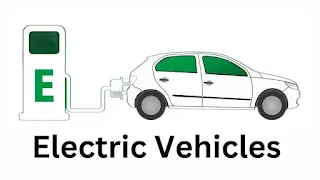What Is EV ?
EV stands for Electric Vehicle. An electric vehicle is a type of vehicle that runs on electricity instead of traditional gasoline or diesel fuel. They use an electric motor and battery to power the vehicle, rather than an internal combustion engine. EVs can be charged by plugging them into a power source, such as a charging station or a regular electrical outlet, and they produce zero emissions while driving, making them an eco-friendly alternative to traditional vehicles. There are several types of electric vehicles, including battery-electric vehicles (BEVs), plug-in hybrid electric vehicles (PHEVs), and hybrid electric vehicles (HEVs).
Future Of Electric vehicles World Wide
The future of Electric Vehicles (EVs) looks promising and exciting. There are several factors contributing to the growth of EVs, including advancements in technology, environmental concerns, government policies, and changing consumer preferences. Here are some trends and predictions for the future of EVs:
Increased adoption:
- EVs are expected to become more popular and mainstream over the next decade, with a projected 58% of global passenger vehicle sales being electric by 2040, according to BloombergNEF.
Battery technology advancements:
- Battery technology is expected to improve, leading to longer driving ranges, shorter charging times, and reduced costs. Solid-state batteries are also being developed, which could offer even greater improvements in energy density and safety.
Charging infrastructure expansion:
- Governments and private companies are investing in building out EV charging infrastructure, which is critical to the widespread adoption of EVs. The number of public charging stations is expected to grow rapidly in the coming years.
Increased affordability:
- As battery costs continue to decline, the price of EVs is becoming more competitive with traditional gas-powered vehicles. In fact, some analysts predict that electric cars will be cheaper to buy than gasoline cars as early as 2025.
Automakers' shift towards EVs:
- Major automakers, such as Volkswagen, General Motors, and Ford, have announced plans to phase out gasoline-powered vehicles and focus on EVs. This shift will likely accelerate the adoption of EVs and drive further improvements in technology and affordability.
Overall, the future of EVs in Worldwide looks bright, All The Country Adopt EV Factory in our Country. Recently China is World biggest manufacturer. EVs with continued growth and innovation expected in the coming years. However, there are still some challenges to overcome, such as battery disposal and recycling, grid capacity for charging, and consumer education.
Future of electric vehicles in India
The future of Electric Vehicles (EVs) in India looks promising, with the government's strong support for EVs and the growing demand for clean energy. Here are some trends and predictions for the future of EVs in India:
Government's Support:
- The Indian government has set ambitious targets to reduce greenhouse gas emissions and promote clean energy. The government has launched several initiatives to promote EVs, such as the Faster Adoption and Manufacturing of Hybrid and Electric Vehicles (FAME) scheme, which provides financial incentives for EVs and their manufacturing.
Cost Reduction:
- The Indian EV market is still in its early stages, but as it grows, economies of scale will bring down the cost of EVs. In the long run, EVs are expected to be more affordable than traditional gasoline-powered vehicles due to lower fuel and maintenance costs.
Charging Infrastructure:
- India's charging infrastructure is improving, with several private and public players investing in building EV charging stations. The government has also launched the National Electric Mobility Mission Plan (NEMMP), which aims to build a robust charging infrastructure in the country.
Shift in Consumer Preferences:
- All The Customer With growing awareness about the environmental benefits of EVs, there is a shift in consumer preferences towards cleaner and more sustainable modes of transportation.
Growth of the EV Market:
- According to a report by the India Energy Storage Alliance (IESA), India's EV market is expected to grow at a CAGR of 43% from 2020 to 2027, driven by factors such as government support, cost reduction, and increased consumer demand.
Overall, the future of EVs in India looks bright, with continued growth and innovation expected in the coming years. However, there are still some challenges to overcome, such as battery disposal and recycling, grid capacity for charging, and consumer education. Nonetheless, the government's support and initiatives, coupled with advancements in battery technology, can help to overcome these challenges and accelerate the adoption of EVs in India.
Electric vehicles in India: challenges and opportunities ppt
we give idea how to make ppt on Electric vehicles (EVs) in India present both challenges and opportunities. Here are some of the key challenges and opportunities:
Challenges:
- High Initial Costs: EVs are often more expensive to purchase than traditional gasoline-powered vehicles, which can be a significant barrier for consumers in India.
- Limited Charging Infrastructure: The lack of a widespread charging infrastructure is another significant challenge for EVs in India. Building charging stations will require significant investment and time.
- Range Anxiety: The limited driving range of most EVs and the lack of charging stations can create anxiety for drivers.
- Battery Disposal and Recycling: Disposing of EV batteries and recycling them is a significant environmental concern.
- Lack of Awareness: There is still limited awareness of EVs among Indian consumers.
Opportunities:
- Government Support: The Indian government has launched several initiatives to promote EVs, including financial incentives, subsidies, and tax exemptions.
- Cost Savings: EVs can offer significant cost savings in the long run due to lower fuel and maintenance costs.
- Growing Demand for Clean Energy: The push towards cleaner energy sources and the rising concern for the environment can drive demand for EVs.
- Attractive Market for EV Manufacturers: With a population of over 1.3 billion, India offers a vast and attractive market for EV manufacturers.
- Advancements in Battery Technology: Advancements in battery technology are making EVs more efficient, affordable, and reliable.
By the given above Point, while there are several challenges to overcome, the Indian EV market offers significant opportunities for growth and development. The government's support and initiatives, coupled with advancements in battery technology, can help to overcome the challenges and accelerate the adoption of EVs in India.
Will Replace EV of Petrol Vehicles?
It is difficult to predict whether electric vehicles (EVs) will completely replace petrol vehicles in the future. However, EVs are rapidly gaining popularity as a cleaner and more sustainable alternative to petrol vehicles. With advancements in battery technology and increased government support for EVs, more consumers are choosing EVs over petrol vehicles.
There are several advantages of EVs over petrol vehicles, including lower operating costs, reduced greenhouse gas emissions, and better performance. As battery technology continues to improve, EVs will be able to travel further on a single charge, and charging times will be reduced. Additionally, the cost of producing batteries is expected to decrease, making EVs more affordable.
However, there are still some challenges that need to be overcome, such as the limited availability of charging infrastructure, higher upfront costs, and range anxiety among consumers. Additionally, the demand for petrol vehicles is still strong, especially in emerging markets where infrastructure and EV adoption may take longer.
Overall, while it is uncertain whether EVs will completely replace petrol vehicles in the future, it is clear that EVs are rapidly gaining momentum and becoming more mainstream. As technology improves and infrastructure develops, it is likely that EVs will continue to gain market share and become a more viable option for consumers looking for a cleaner and more sustainable mode of transportation.


